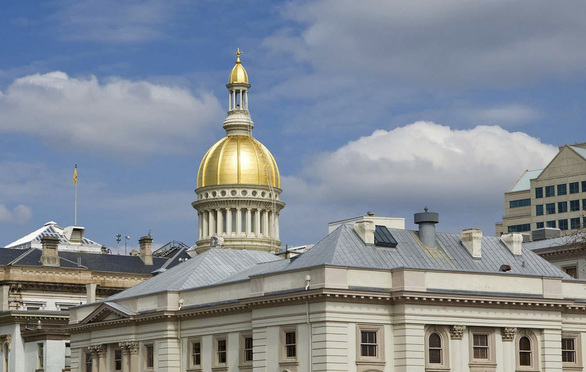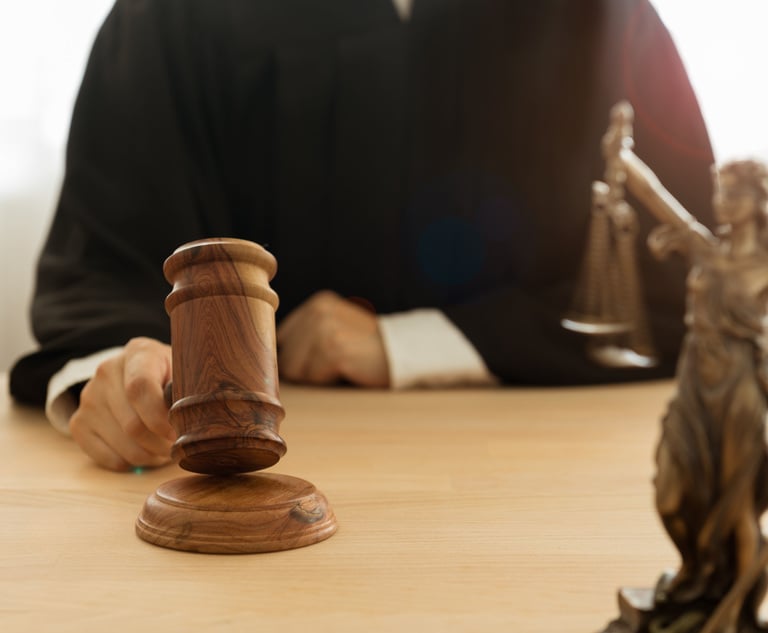Ruling on Legislative Intervention Will Weigh Heavily on NJ Case Over Donation Disclosure Law
In 'Americans for Prosperity v. Grewal,' it is not hard to speculate on the reasons why the Legislature would seek to complicate the representation of the state already required to be provided by the attorney general.
November 03, 2019 at 10:00 AM
7 minute read
 New Jersey State House
New Jersey State House
N.J.S.A. § 52:17A-4(c) provides that the attorney general, through the Division of Law, "shall exclusively attend to and control all litigation and controversies to which the State is a party or in which its rights and interests are involved." Despite that facially unambiguous allocation of power, there have been frequent instances in which the state Legislature, through its officers and by its own counsel, has been granted party-intervenor status—with all the attendant rights and prerogatives—in a matter in which the state or a state agency is the defendant, even though the attorney general has entered an appearance and should, according to the statute, "exclusively attend to and control" the litigation on behalf of the state.
Thus, intervention by the Senate president and Assembly speaker was permitted by the federal district court in Waterfront Commission of New York Harbor v. Murphy, in which the court recently struck down the state legislation by which New Jersey is attempting to withdraw unilaterally from an interstate compact with New York. Intervention by the same officers was also permitted in NCAA v. Christie, the well-known "sports betting" case. And most recently, the Senate president and Assembly speaker have moved to intervene in Americans for Prosperity v. Grewal, No. 19 Civ. 14228, challenging the constitutionality of S-510, the "dark money disclosure" law, after the district court issued a preliminary injunction against enforcement of the statute, citing likely First Amendment infirmities.
For purposes of this editorial, we will assume that the Senate president and Assembly speaker are authorized to represent the Legislature as a whole. Nevertheless, one may wonder why the Legislature would seek to duplicate, and in some cases perhaps complicate, the representation of the state already required by the statute to be provided by the attorney general. In Americans for Prosperity v. Grewal, it is not hard to speculate on the reasons. The governor has publicly expressed his doubts about the constitutionality of the statute (at one point conditionally vetoing a substantially identical earlier version of the bill) and the statute is itself a byproduct of the current political friction between the governor and the Legislature. The Legislature may rightfully doubt the enthusiasm of the current executive branch to defend the law, and may hope that intervenor status will allow it to file an appeal even if the attorney general should decline to do so.
The motion to intervene cites both Federal Rule of Civil Procedure 24(b)(1)(B) for permissive intervention and Federal Rule of Civil Procedure 24(b)(2) which provides: "On timely motion, the court may permit a federal or state governmental officer or agency to intervene if a party's claim or defense is based on: (A) a statute or executive order administered by the officer or agency; or (B) any regulation, order, requirement, or agreement issued or made under the statute or executive order."
Putting aside interpretation of Fed. R. Civ. P. 24, there is the separate, constitutional issue of whether the Legislature has Article III standing in federal court, a question that would take on particular relevance if the Legislature should attempt to appeal a lower court ruling even if the state, through the attorney general, does not.
This past June, in Virginia House of Delegates v. Bethune-Hill, 139 S. Ct. 1945 (2019), the United States Supreme Court dismissed for lack of jurisdiction an appeal brought by one house of the Virginia Legislature challenging a lower court ruling that the redistricting map the Legislature had devised was the result of unconstitutional racial gerrymandering. Although the Commonwealth of Virginia, through its attorney general, had appeared in the bench trial conducted by the three judge district court, the Virginia House of Delegates and its speaker intervened as defendants and, according to Justice Ginsburg's majority opinion, "carried the laboring oar" in urging the constitutionality of the map.
After the district court ruled that the map was unconstitutional, the Virginia attorney general announced that the state would not pursue an appeal, which he stated "would not be in the best interest of the Commonwealth or its citizens." The House of Delegates, however, filed an appeal on its own to the Supreme Court. In dismissing the appeal, the majority relied on a Virginia statute, Va. Code Ann. §2.2-507(A) (2017), which provides that: "All legal service in civil matters for the Commonwealth, the Governor, and every state department, institution, division, commission, board, bureau, agency, entity, official, court, or judge . . . shall be rendered and performed by the Attorney General … ." The court interpreted this statute as providing that "[a]uthority and responsibility for representing the State's interests in civil litigation … rest exclusively with the State's Attorney General." The court also based its denial of standing on the fact that only the House had sought to appeal, concluding that "One House of its bicameral legislature cannot alone continue the litigation against the will of its partners in the legislative process." Justice Alito, speaking for the four dissenters, bypassed the effect of the Virginia statute and found that the House of Delegates had standing in its own right—even if not representing the Commonwealth per se—to assert its own institutional prerogatives. Justice Alito also rejected the argument advanced by the solicitors general of both the United States and Virginia that it would violate the separation-of-powers doctrine to invest a legislature with the power to seek judicial relief, which they argued was an inherently executive function. We leave our thoughts on both these interesting topics to a future editorial.
It is interesting to note that in asserting its standing, the Virginia House of Delegates relied on a case from New Jersey, Karcher v. May, 484 U.S. 72 (1987), in which the then attorney general refused to defend the school "moment of silence" statute, which had been passed only by overriding Gov. Kean's veto. The Senate president and Assembly speaker therefore intervened and defended the statute on their own. On the constitutional merits the statute was struck down as violative of the Establishment Clause both by the district court and by the Third Circuit.
Upon review, the Supreme Court dismissed the appeal for want of jurisdiction because the two legislative officers had lost their positions in a subsequent election and their successors in office withdrew the appeal. Had their successors in office decided to remain in the case, however, Karcher did suggest, albeit arguably in dictum, they could have done so in their official capacities, since it observed that "the New Jersey Legislature had authority under state law to represent the State's interests."
In an almost apologetic tone, however, Justice Ginsburg noted that the Karcher Court made this observation "without extensive explanation," and, "[o]f crucial significance … the Court in Karcher noted no New Jersey statutory provision akin to Virginia's law vesting the Attorney General with exclusive authority… ." Of course, New Jersey in fact had such a statute, N.J.S.A. § 52:17A-4(c), which was enacted in 1944. Although we are speculating, the fact that Justice Ginsburg worded her statement as "[the Court] noted no New Jersey statutory provision," rather than "New Jersey has no statutory provision," may be an implicit admission that the court in 1987 was simply unaware of its existence, but may now be the beneficiary of superior legal research in 2019.
The future of Karcher in light of Virginia House of Delegates presents an important and interesting issue for the court in Americans for Prosperity v. Grewal that has implications far beyond the current political squabbles in Trenton.
This content has been archived. It is available through our partners, LexisNexis® and Bloomberg Law.
To view this content, please continue to their sites.
Not a Lexis Subscriber?
Subscribe Now
Not a Bloomberg Law Subscriber?
Subscribe Now
NOT FOR REPRINT
© 2025 ALM Global, LLC, All Rights Reserved. Request academic re-use from www.copyright.com. All other uses, submit a request to [email protected]. For more information visit Asset & Logo Licensing.
You Might Like
View All

Judge Jablonski and Chief Justice Rabner Both Acted Completely Properly
4 minute read
In 2-1 Ruling, Court Clears Way for Decade-Old Wrongful Imprisonment Suit
5 minute read
Trending Stories
- 1Attorney Sanctioned $9K for Revealing Nude Photos, Other Info in Court Filing
- 2Shifting Battlegrounds in Administrative Law, From Biden to Trump II
- 3Bar Report - Jan. 13
- 4Newsmakers: Robert Collins, Barron Wallace Elected to Bracewell’s Management Committee
- 5Navigating the Shifting Sands of E-Discovery and Information Governance in 2025
Who Got The Work
Michael G. Bongiorno, Andrew Scott Dulberg and Elizabeth E. Driscoll from Wilmer Cutler Pickering Hale and Dorr have stepped in to represent Symbotic Inc., an A.I.-enabled technology platform that focuses on increasing supply chain efficiency, and other defendants in a pending shareholder derivative lawsuit. The case, filed Oct. 2 in Massachusetts District Court by the Brown Law Firm on behalf of Stephen Austen, accuses certain officers and directors of misleading investors in regard to Symbotic's potential for margin growth by failing to disclose that the company was not equipped to timely deploy its systems or manage expenses through project delays. The case, assigned to U.S. District Judge Nathaniel M. Gorton, is 1:24-cv-12522, Austen v. Cohen et al.
Who Got The Work
Edmund Polubinski and Marie Killmond of Davis Polk & Wardwell have entered appearances for data platform software development company MongoDB and other defendants in a pending shareholder derivative lawsuit. The action, filed Oct. 7 in New York Southern District Court by the Brown Law Firm, accuses the company's directors and/or officers of falsely expressing confidence in the company’s restructuring of its sales incentive plan and downplaying the severity of decreases in its upfront commitments. The case is 1:24-cv-07594, Roy v. Ittycheria et al.
Who Got The Work
Amy O. Bruchs and Kurt F. Ellison of Michael Best & Friedrich have entered appearances for Epic Systems Corp. in a pending employment discrimination lawsuit. The suit was filed Sept. 7 in Wisconsin Western District Court by Levine Eisberner LLC and Siri & Glimstad on behalf of a project manager who claims that he was wrongfully terminated after applying for a religious exemption to the defendant's COVID-19 vaccine mandate. The case, assigned to U.S. Magistrate Judge Anita Marie Boor, is 3:24-cv-00630, Secker, Nathan v. Epic Systems Corporation.
Who Got The Work
David X. Sullivan, Thomas J. Finn and Gregory A. Hall from McCarter & English have entered appearances for Sunrun Installation Services in a pending civil rights lawsuit. The complaint was filed Sept. 4 in Connecticut District Court by attorney Robert M. Berke on behalf of former employee George Edward Steins, who was arrested and charged with employing an unregistered home improvement salesperson. The complaint alleges that had Sunrun informed the Connecticut Department of Consumer Protection that the plaintiff's employment had ended in 2017 and that he no longer held Sunrun's home improvement contractor license, he would not have been hit with charges, which were dismissed in May 2024. The case, assigned to U.S. District Judge Jeffrey A. Meyer, is 3:24-cv-01423, Steins v. Sunrun, Inc. et al.
Who Got The Work
Greenberg Traurig shareholder Joshua L. Raskin has entered an appearance for boohoo.com UK Ltd. in a pending patent infringement lawsuit. The suit, filed Sept. 3 in Texas Eastern District Court by Rozier Hardt McDonough on behalf of Alto Dynamics, asserts five patents related to an online shopping platform. The case, assigned to U.S. District Judge Rodney Gilstrap, is 2:24-cv-00719, Alto Dynamics, LLC v. boohoo.com UK Limited.
Featured Firms
Law Offices of Gary Martin Hays & Associates, P.C.
(470) 294-1674
Law Offices of Mark E. Salomone
(857) 444-6468
Smith & Hassler
(713) 739-1250






